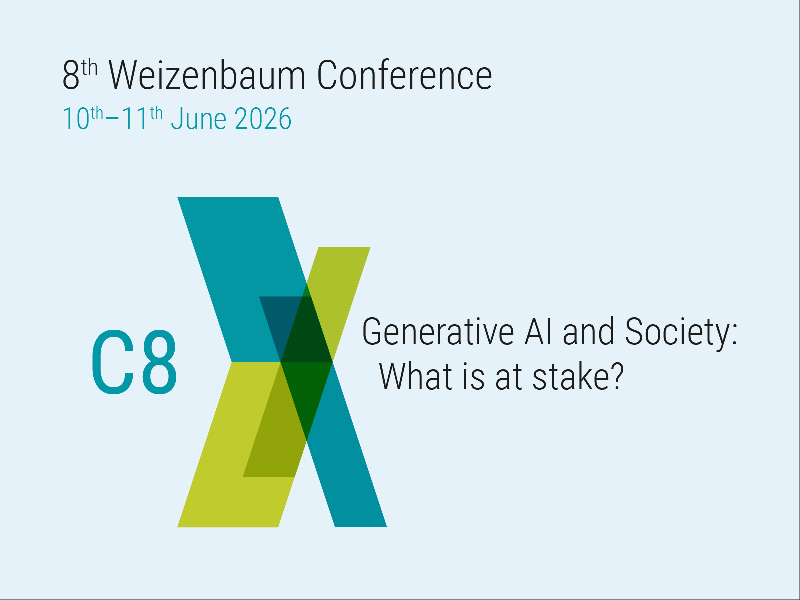
Weizenbaum Conference 2026: Call for Papers
11/27/2025The Weizenbaum Institute will host its 8th annual Conference on the topic “Generative AI and Society: What is at stake?“ We invite interested scholars to submit papers for presentations. The conference will take place in Berlin, Germany from 10 to 11 June 2026.
Generative AI (GenAI) has permeated society instantly. The speed and manner in which it is constantly affecting more and more areas of social life is causing concern among societal, political, and economic actors: How to integrate GenAI in work routines and knowledge production, while avoiding its biases and pitfalls? How to use new technological options without becoming dependent on Big Tech? How to explore opportunities for societal progress, while AI systems are shaped by strong power relations?
Yet, since the release of GenAI, society has had little time to adapt to these new developments, and so has research. While there is no lack of early experimental studies and speculation, a sound assessment of the impact of these developments on power relations and inequalities, the transformation of work, and new developments in knowledge production is still missing. Also, the scientific community itself is grappling with this new technology within its own field.
The Weizenbaum Conference 2026 seeks to convene research from various disciplines on how GenAI affects society. In line with the work of Joseph Weizenbaum, himself a pioneer of AI research, the conference focuses on the relationship between technology and societal values and the challenges posed by the spread of GenAI in terms of political power relations, the economy, and the workplace as well as academic research, artistic originality and copyright. As the introduction of GenAI cuts across boundaries between diverse social fields such as academia, civil society, culture, the economy, and politics we invite contributions from different disciplines and particularly with a trans- or interdisciplinary background for presenting, discussing, and understanding the impact of GenAI in a comprehensive way.
Thematic Streams
The conference is dedicated to an assessment of findings on these developments and serves as an invitation for debate based on sound research results. It is organized along two broad thematic streams, which focus on how GenAI challenges and affects knowledge work and knowledge production in diverse settings.
Working with GenAI: Accumulation, Productivity and Work Quality
The use of GenAI is affecting those professions that were previously considered to be immune to automation, i.e. knowledge-based and creative tasks. While it is instrumental in substituting certain tasks, it also opens a new realm of possibilities through the co-creation with human actors. These developments entail tensions with regard to the relationship between Big Tech and conventional enterprises, the distribution of profit and benefits, and the overall impact of GenAI on workers’ skills and subjectivities.
The stream on knowledge work will focus on new forms of human-machine interaction with GenAI and asks about winners and losers of the imminent transformation of the economy, including
- GenAI at work: winners, losers and new dependencies
- the relationship between substitution and augmentation of work,
- new forms of human-machine interaction and their subjective experience,
- new skills and experiential knowledge in working with AI.
GenAI in Knowledge Production: Epistemic Power and the Transformation of Expertise
GenAI is transforming the way knowledge is produced. It generates actionable knowledge for decision making in fields such as medicine, law, or public administration, while also playing an increasingly central role in creating new knowledge, for instance, within academic research. Consequently, the boundary between mere support and genuine co-creation in reasoning and decision-making becomes blurred, raising questions about the status of human expertise, but conversely also about the role ascribed to GenAI, the expectations attached to it, and its actual performance.
This stream therefore asks: How do the use of GenAI and the surrounding expectations transform the status of human expertise? How do they exercise epistemic power, thereby altering social practices of knowledge production and affecting the knowledge that is produced? And what are the implications for concepts of creativity and innovativeness, as well as for perceptions of integrity, originality, and legitimacy regarding the produced knowledge? It invites research that addresses these questions from different angles and in different societal domains looking at:
- ascribed roles and expectations towards GenAI and the transformation of expertise,
- epistemic power and changes in knowledge production and in the knowledge produced,
- shifts in concepts of creativity and innovativeness and in perceptions of integrity, originality, and legitimacy of knowledge,
- GenAI in academia and its implications for research practice.
We welcome abstracts of up to 500 words until 23:59 31 January 2026.
More information on the Weizenbaum Conference 2026